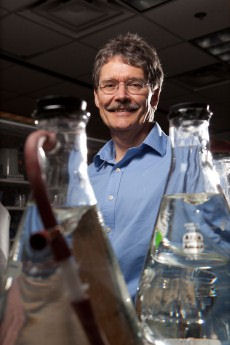26 March 2013
Biofuels could be made directly from excess CO2 in the atmosphere, say scientists
by Will Parker
 Researchers at the University of Georgia have found a way to transform carbon dioxide in the atmosphere into a variety of useful industrial products. Their discovery may soon lead to the creation of biofuels made directly from carbon dioxide in the air - one of the major driving forces of global climate change. Details about the new research appear in the Proceedings of the National Academies of Sciences.
Researchers at the University of Georgia have found a way to transform carbon dioxide in the atmosphere into a variety of useful industrial products. Their discovery may soon lead to the creation of biofuels made directly from carbon dioxide in the air - one of the major driving forces of global climate change. Details about the new research appear in the Proceedings of the National Academies of Sciences.
"What we have done is create a microorganism that does with carbon dioxide exactly what plants do - absorb it and generate something useful," said Michael Adams, a professor of biotechnology (pictured).
While plants can be fermented into fuels like ethanol, the process remains stubbornly inefficient, despite ongoing research efforts by scientists around the world.
"What this discovery means is that we can remove plants as the middleman," explained Adams. "We can take carbon dioxide directly from the atmosphere and turn it into useful products like fuels and chemicals without having to go through the inefficient process of growing plants and extracting sugars from biomass."
The process is made possible by a microorganism called Pyrococcus furiosus which thrives by feeding on carbohydrates in the super-heated ocean waters near geothermal vents. By manipulating the organism's genetic material, Adams and his colleagues created a kind of P. furiosus that is capable of feeding at much lower temperatures on carbon dioxide.
The research team then used hydrogen gas to create a chemical reaction in the microorganism that incorporates carbon dioxide into 3-hydroxypropionic acid, a common industrial chemical used to make acrylics and many other products. With additional genetic manipulations, Adams believes P. furiosus could generate a host of other useful industrial products, including fuel.
Importantly, fuels created from the process would release the same amount of carbon dioxide used to create them, effectively making them carbon neutral. "This is an important first step that has great promise as an efficient and cost-effective method of producing fuels," Adams concluded. "In the future we will refine the process and begin testing it on larger scales."
Related:
Discuss this article in our forum
Biofuels' "green" credentials questioned
"Green" biofuels anything but
Report Pooh-Poohs Corn Biofuels
Source: University of Georgia
